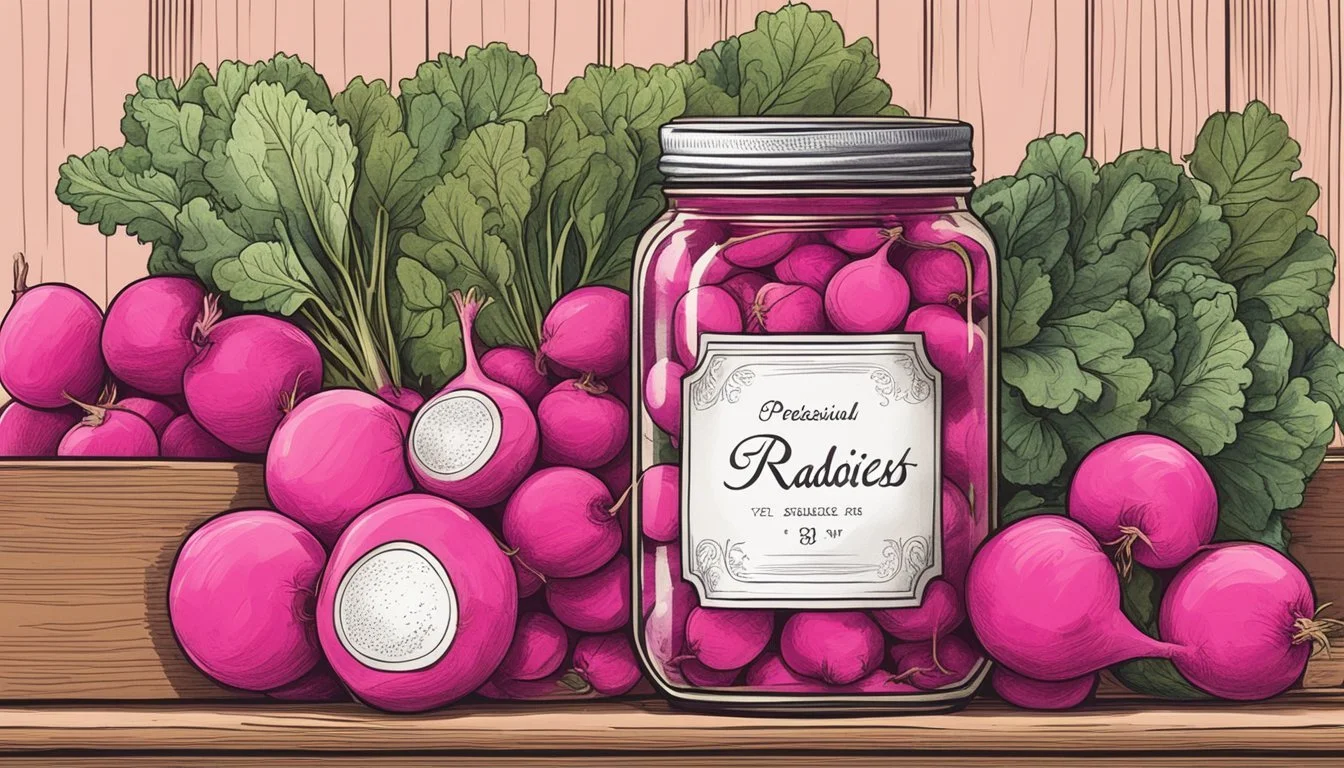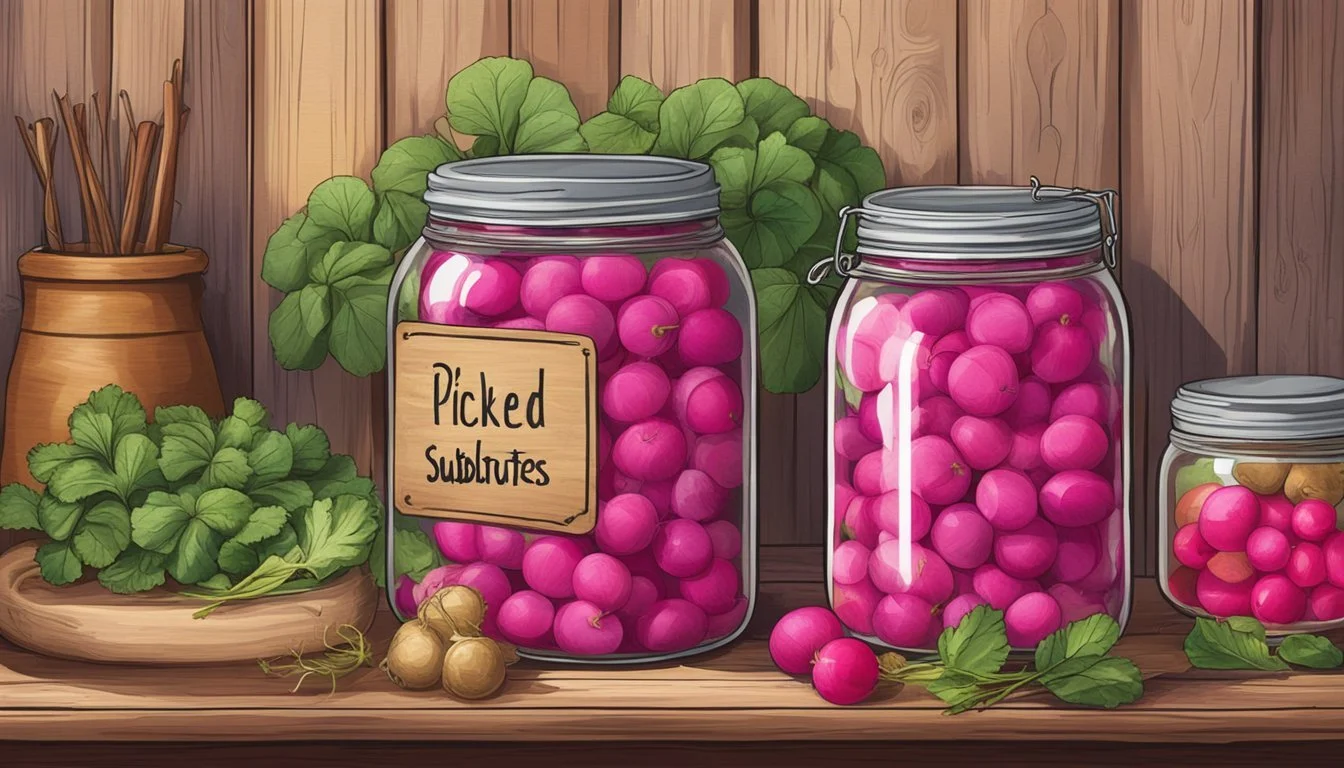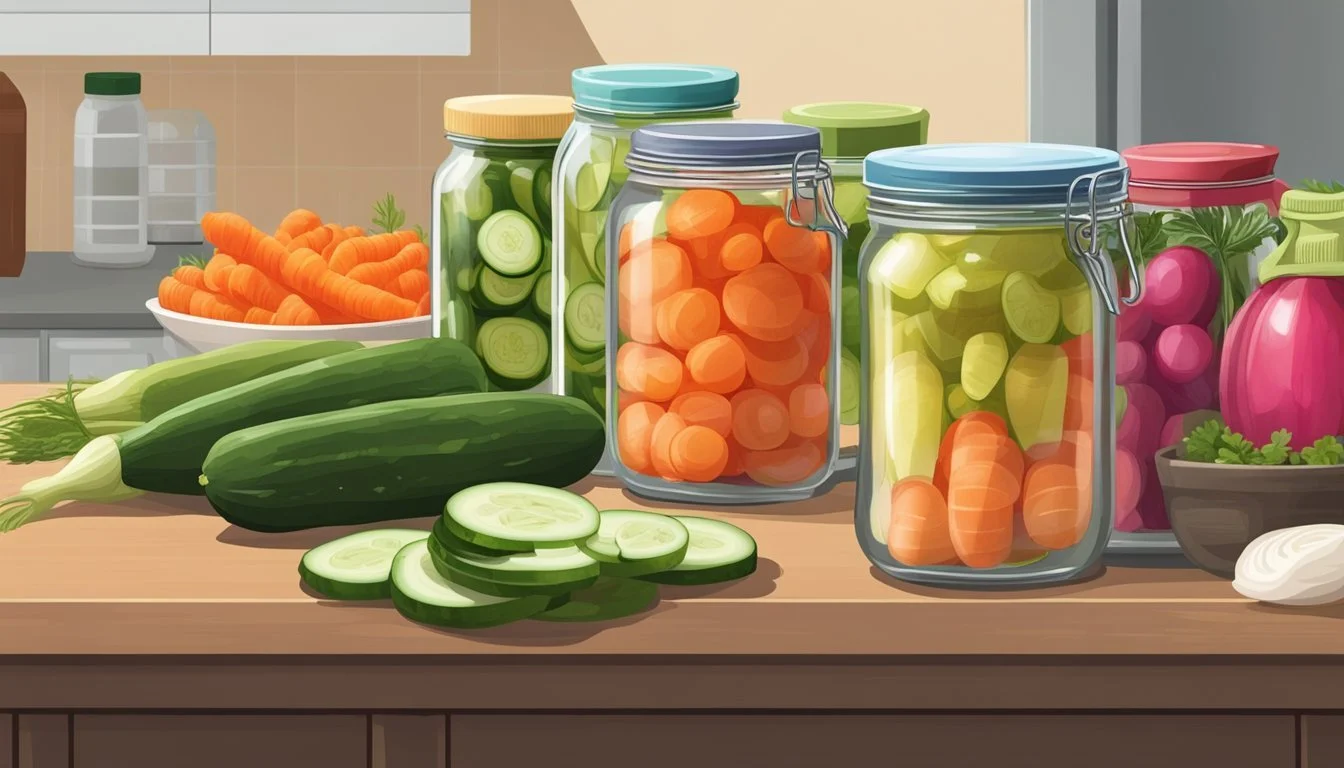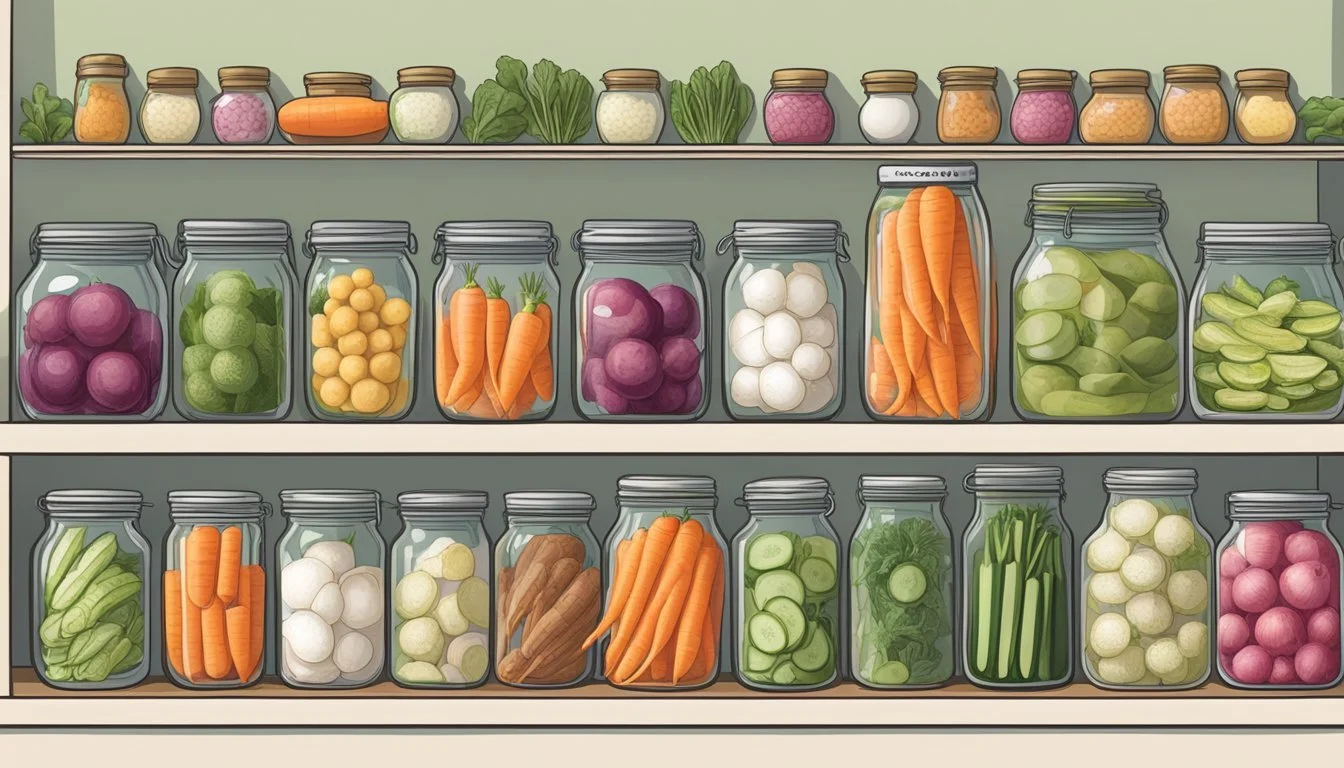Pickled Radish Substitutes
Best Alternatives for Your Recipes
Finding the perfect substitute for pickled radish can enhance your dish without sacrificing flavor or texture. If you're looking for a healthy alternative, white turnips can be an excellent choice. Peel and finely slice or shred them to emulate the crispness and appearance of radish.
Another suitable option could be carrots, especially in recipes where sweetness and crunch are desired. Carrots may not offer the exact same texture but work well when finely sliced or shredded. Water chestnuts bring a unique crispness and mild sweetness, making them an intriguing substitute, particularly in Asian-inspired dishes.
Exploring these substitutes can provide diverse flavors and textures to your culinary creations while maintaining a healthy profile. Red radishes, too, present a slightly spicier and more pungent variant, offering distinct taste layers to any recipe requiring pickled radish.
Understanding Pickled Radish
Pickled radish is a delicious and nutritious addition to various dishes, offering both health benefits and culinary versatility. This section explores its nutritional profile and common uses in cuisine.
Nutritional Profile
Pickled radish is rich in vitamins and minerals, making it a healthy choice. Vitamin C stands out as a key nutrient, contributing to immune support and skin health. Additionally, radishes are high in fiber, promoting digestive health and aiding in maintaining a healthy weight.
Apart from vitamin C and fiber, pickled radishes provide essential minerals like calcium, potassium, and magnesium. These minerals support bone health, heart function, and muscle function, respectively. When pickled, the radish retains much of its nutritional value while adding unique flavors and textures to dishes.
Common Uses in Cuisine
Pickled radish is widely used in Asian cuisine, particularly in Korean dishes. The Korean radish, known as mu or daikon, is frequently pickled and served as banchan (side dishes) with meals. It adds a refreshing crunch and tangy flavor that complements spicy and savory foods.
In other Asian culinary traditions, pickled radish is commonly found in sushi rolls, bento boxes, and as a garnish. Its versatility allows it to be paired with meats, fish, and even vegetarian dishes. In Western cuisine, it can be used in salads, sandwiches, and tacos, adding a zesty twist to familiar dishes.
Why Substitute Pickled Radish?
Substituting pickled radish can address various needs, such as dietary restrictions, personal taste preferences, or availability issues. Understanding these factors can help you find the perfect alternative.
Dietary Restrictions
Food allergies or specific dietary needs often necessitate finding a substitute for pickled radish. Some individuals may have an allergy to radishes or related vegetables, which can cause discomfort or health issues. Choosing an alternative like horseradish root or daikon radish allows you to maintain the dish's essence without compromising safety.
Vegan or gluten-free diets can also affect the choice of pickled radish substitutes. Commercial pickled radishes sometimes contain preservatives or additives that are not suitable for these diets. Opting for natural substitutes or homemade versions ensures that dietary standards are met.
Taste Preferences
Personal taste plays a pivotal role in the substitution of pickled radish. The spicy, tangy profile of pickled radish might not appeal to everyone. For those who prefer a milder flavor, parsnips offer a sweet alternative without the bite of radish.
Daikon radish is another excellent substitute with a milder, slightly sweet taste compared to the more pungent pickled radish. This makes it suitable for dishes where the flavor of the radish might otherwise be too overpowering. Cabbage hearts can also be considered for their less intense taste and crunchy texture.
Availability Issues
Availability can often be a challenge, particularly if your local supermarket does not stock pickled radish. Seasonal changes or supply chain issues can result in an inconsistent supply, making it necessary to find substitutes.
Daikon radish is widely available in many supermarkets and can easily replace pickled radish in most recipes. In situations where fresh produce is limited, canned or jarred alternatives like pickled cucumbers or shredded cabbage can also serve as viable substitutes.
Parsnips and pony tail radishes are typically available year-round and can be found in most grocery stores, providing flexible alternatives to address availability concerns. These options ensure that recipes remain accessible regardless of stock issues.
Flavorful Substitutes for Pickled Radish
Pickled radishes bring a unique combination of crisp texture and tangy, spicy flavor to many dishes. When seeking substitutes, look for vegetables that offer a similar crunch and complex flavor profile.
Daikon Radish
Daikon radish is a larger, milder version of the common radish, known for its crunchy texture and slightly sweet flavor. When pickled, daikon retains a satisfying crispness and soaks up the tangy brine beautifully.
It is popular in Asian cuisine, particularly in Japanese, Korean, and Chinese dishes. The mildness of daikon makes it versatile, allowing it to complement a wider variety of flavors without overpowering other ingredients.
Turnips and White Turnips
Turnips, including the white variety, are excellent substitutes for pickled radishes. They have an earthy taste and a firm texture that holds up well to pickling. White turnips, in particular, have a slightly milder and sweeter flavor compared to their purple-topped counterparts.
When pickled, turnips acquire a tangy, savory bite that pairs well with meats and other hearty dishes. They are commonly used in Middle Eastern cuisines and can be found in various traditional salads and side dishes.
Jicama
Jicama, a root vegetable from Mexico, has a sweet, nutty flavor and a highly crisp texture. While it lacks the spicy, peppery flavor of radishes, its natural sweetness offers a pleasant contrast when pickled. This can add an unexpected but enjoyable twist to dishes.
Jicama is incredibly healthy, offering a good amount of dietary fiber and vitamin C. Its sturdy texture ensures it remains crunchy even when pickled, adding a refreshing element to any recipe it is used in.
Watermelon Radish
Watermelon radish is known for its striking pink interior and mild flavor. It has a subtle peppery taste, making it a visually appealing and flavorful substitute for pickled radish. When pickled, watermelon radishes maintain their crunch and take on a slightly sweeter flavor.
Their vibrant color can enhance the aesthetic appeal of dishes, making them popular in gourmet salads and garnishes. The mild spiciness and crisp texture make watermelon radish a versatile and attractive substitute.
Substitutes Based on Texture
When replacing pickled radish in recipes, it's essential to consider substitutes that offer a similar texture, ensuring the dish remains satisfying. Various crunchy and crisp-textured vegetables can mimic the bite and freshness of radishes.
Crunchy Vegetables
Carrots: Carrots are widely known for their crunchiness and slightly sweet taste. Sliced or julienned carrots can replace pickled radishes, adding a bright pop of color and consistent crunch to salads and side dishes.
Kohlrabi: Also known as the German turnip, kohlrabi has a firm, crunchy texture that makes it a great substitute. It has a mild, slightly sweet flavor that complements many dishes. When pickled, kohlrabi maintains its crunch while absorbing the tangy brine flavors.
Root Vegetables with a Crisp Texture
Celery Root: Celery root, or celeriac, offers a unique, crisp texture similar to radishes. When sliced thin or julienned, it adds a delicate crunch to dishes. It’s less spicy than radishes and has a slightly nutty flavor, making it an intriguing alternative in pickled form.
Jicama: This root vegetable, popular in Mexican cuisine, is renowned for its ultra-crisp texture and mildly sweet flavor. Jicama’s crunch makes it a fantastic radish substitute in pickling recipes, maintaining its firmness and refreshing bite even after being pickled.
Choosing the right substitute based on texture ensures that the replacement will closely match the original ingredient’s role in the recipe.
Visual and Textural Alternatives
When looking for substitutes for pickled radish, it is important to consider both appearance and texture. Alternatives like bell peppers, cucumbers, and green papaya not only match the visual appeal but also provide a satisfying crunch.
Bell Pepper
Bell peppers are a colorful and crunchy substitute for pickled radish. They come in various colors—red, yellow, green, and orange—which can add visual interest to any dish. The crisp texture of bell peppers closely mimics that of pickled radish, making them an excellent alternative.
To use bell peppers as a substitute, simply slice them into thin strips. Their mild flavor does not overshadow other ingredients, allowing them to blend seamlessly into salads and sandwiches. Moreover, they pack a punch of vitamins A and C, adding nutritional value to your meal.
Cucumber
Cucumbers are another great alternative, known for their refreshing taste and crisp texture. Their high water content makes them particularly juicy, which can be very pleasing in various dishes. Visually, cucumbers are pale green with a smooth exterior, providing a subtle but attractive appearance.
To substitute cucumbers for pickled radish, slice or julienne them to match the size and shape you need. They work well in salads, sushi, and wraps, where their cool, crunchy texture complements other components. Additionally, cucumbers are low in calories, making them a healthy choice for those watching their intake.
Green Papaya
Green papaya offers a unique, crunchy texture that’s surprisingly similar to pickled radish. Although it lacks the vibrant color of bell peppers, its light green hue can still be visually appealing. Green papaya is firm, allowing it to maintain its crunch even after being marinated or pickled.
To use green papaya, peel and shred it into thin strips. It can be used in salads like the classic Thai som tam, where its neutral flavor absorbs the dressing well. This versatility makes green papaya an excellent choice when looking to substitute pickled radish, providing both crunch and a subtle appearance.
Each of these substitutes brings its own set of characteristics to the table. Bell peppers add color, cucumbers offer refreshing crunch, and green papaya maintains texture and absorption capacity. This makes them excellent visual and textural alternatives to pickled radish.
Cooking with Substitutes
When substituting pickled radish in various dishes, it's essential to consider the texture and flavor of the alternatives. Different substitutes can be more effective in certain cooking methods and culinary applications.
Incorporation in Soups and Stews
Pickled radish has a unique tanginess that enhances soups and stews. Alternatives like parsnips and horseradish can offer similar results. Parsnips, with their creamy texture and subtle sweetness, blend well in broths without overpowering other ingredients.
Horseradish, on the other hand, adds a kick, perfect for spicier dishes. Jicama and kohlrabi work well too, their crispy texture holding up against prolonged cooking. It's essential to chop these substitutes uniformly to ensure even cooking and texture.
Salads and Slaws
In raw preparations like salads and slaws, the crunchiness of pickled radish is paramount. Jicama is an excellent substitute, providing a sweet and nutty flavor that complements greens and vinaigrettes. Use it in a 1:1 ratio for a similar textural experience.
Kohlrabi is another good option with its slight sweetness and crunch. Red radishes can also be used; they add a colorful and spicy element to salads. Water chestnuts offer a unique crispness but have a milder flavor, making them a versatile choice for various salad compositions.
Roasting and Grilling
For roasted or grilled dishes, parsnips and watermelon radishes are attractive alternatives. Parsnips become tender and caramelized under heat, enhancing their sweetness, making them a delightful side.
Watermelon radishes, with their vivid color and slight bite, add visual appeal and a robust flavor. Consider kohlrabi for roasting as well, as its dense texture holds up nicely, becoming soft and slightly sweet. It's recommended to coat these vegetables with a bit of oil and seasoning to bring out their natural flavors during the roasting or grilling process.
Health Considerations
When considering substitutes for pickled radish, it's crucial to compare their nutritional value. Different substitutes offer varying levels of fiber, calories, vitamins, and minerals, each impacting health in particular ways.
Caloric and Fiber Content
Substitutes like jicama and parsnips vary in their caloric and fiber content.
Jicama is a low-calorie option, with about 38 calories per 100 grams and provides a significant amount of dietary fiber, which aids digestion. Parsnips, on the other hand, contain approximately 75 calories and offer about 4.9 grams of fiber per 100 grams.
These substitutes can support digestive health by ensuring adequate fiber intake, which can help maintain healthy bowel movements and reduce the risk of constipation.
Vitamin and Mineral Comparison
Different substitutes provide varying levels of vitamins and minerals essential for overall health. For example:
Jicama is rich in vitamin C, delivering around 20% of the daily recommended intake per 100 grams. This helps support immune function and skin health. Additionally, it contains potassium, which is essential for maintaining proper heart function.
Parsnips provide about 14% of the daily value of vitamin C per 100 grams and are also a good source of essential minerals like potassium and magnesium. These minerals are critical for muscle function and maintaining healthy blood pressure levels.
By choosing the right substitute, you can ensure a diet that supports both immune function and overall nutrient balance.
Selecting the Right Substitute
When selecting a substitute for pickled radish, it’s important to match taste, texture, and nutritional value as closely as possible. This ensures that the replacement not only enhances the dish but also meets dietary preferences and requirements.
Taste and Flavor Matching
Matching the taste and flavor of pickled radish is crucial. Radishes have a peppery taste that can be mild or spicy. Horseradish is an option with a similar spicy kick, making it an ideal replacement in dishes that benefit from a bold flavor.
Jicama, while having a sweeter and nutty taste, can still work due to its crunchy texture. For those seeking a less spicy alternative, watermelon radish offers a milder peppery flavor. Use these substitutes at a 1:1 ratio to maintain balance in recipes.
Texture and Consistency
Pickled radish has a crunchy consistency that is important in many recipes, particularly in salads and as a garnish. Jicama stands out for its crispness, making it a top choice for texture.
Daikon radish also provides a similar crunch and can be sliced thinly just like regular radishes. Water chestnuts can substitute in terms of crunchiness but lack the peppery kick radish offers. Consider these substitutes based on how crucial the crunch is to your dish.
Nutritional Equivalence
Looking at the nutritional aspects, radishes are low in calories and high in vitamins and minerals such as Vitamin C. Turnips share a similar profile and are a good source of fiber.
Parsnips can also be considered as they are rich in fiber and vitamins, although they have a slightly different taste. Jicama is another excellent substitute due to its high water content and low calorie count. Ensure that the substitute meets dietary needs while complementing the dish’s overall health benefits.







